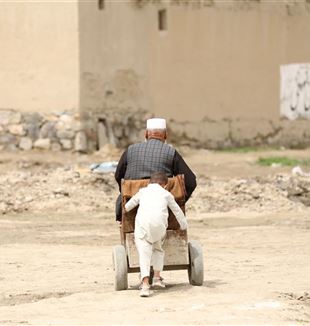
Meeting 2021: Afghanistan, is all lost?
Wednesday, August 25 at the Rimini Meeting (at 11 am, Sala Tiglio) a dialogue on the situation in Afghanistan. From the intervention of President Ghani's wife at the 2015 Meeting, to the shocking current events in Kabul. From "Quotidiano Meeting".Once upon a time there was an Afghanistan that dreamed. President Ghani's wife, the first lady Rula, of Lebanese and Christian origin and who has wished to be called by her Afghan name, spoke of it at the 2015 Meeting. She was listed by Time magazine as one of the 100 leaders who could change the world. And in those years, in spite of everything: the massacres, the implacable violence, the terrible poverty, the crushed human rights; in spite of all that, in those years in Kabul people still dreamed, still believed, still worked for a new country.
Bibi Gul Ghani was a point of reference for hundreds of associations, initiatives and projects: from the fight against illiteracy to aid for women, from small businesses to the family, from the rehabilitation of those wounded in countless wars to health education. It was an incredible success that for years animated one of the darkest places on the planet, which situated at the top of all the negative rankings: poverty, underdevelopment, human rights, damage caused by conflict. That Afghanistan was trying, also thanks to the protection of Western military missions. How often have we heard stories of Italian soldiers also engaged in rebuilding schools and assisting children. Let us extend this over twenty years and across the various Western contingents: Spanish, German, British (even the Americans, even if today President Biden tells us that "we didn't go there to nation-build […] we did what we went to do in Afghanistan: to get the terrorists who attacked us. […] We went and did the mission […] It’s time to end this war") and others. How many volunteers, how many NGOs have been involved in Afghanistan for all these years? An incalculable number: in these hours, when it comes to saving thousands of Afghans who have worked with westerners (not just in the armies) we still do not know.
That Afghanistan ended with the taking of Kabul by the Taliban on Monday, August 16, the first day of the second Islamic Emirate of Afghanistan.
Perhaps it had already come to an end, since that rapid unstoppable countdown triggered by the Doha agreements that put America back in front of its enemies, and perhaps its nightmares. In a few days it will be the anniversary of September 11. And there is an image, which is cruel and heart-breaking, that seals the beginning and the end of this twenty-year period, the time of a generation: the bodies that fall from the Twin Towers in flames and the bodies that fall from the plane that is about to take-off from the infernal nightmare of Kabul.
For the past ten days or so many questions have been crowding our minds, questions that lie far beyond the hour-by-hour news: what really happened? How do we explain such disaster? Is all lost? What will become of those dreams, of that commitment? And of those women, those children desperately thrown into the arms of the soldiers?
Tomorrow, here at the Meeting (11 a.m., Sala Tiglio) we will try to look together at the shocking events of these days. Without claiming to find the answers, but with that passion for reality that is the very reason for our meeting here, year after year.#Meeting2021